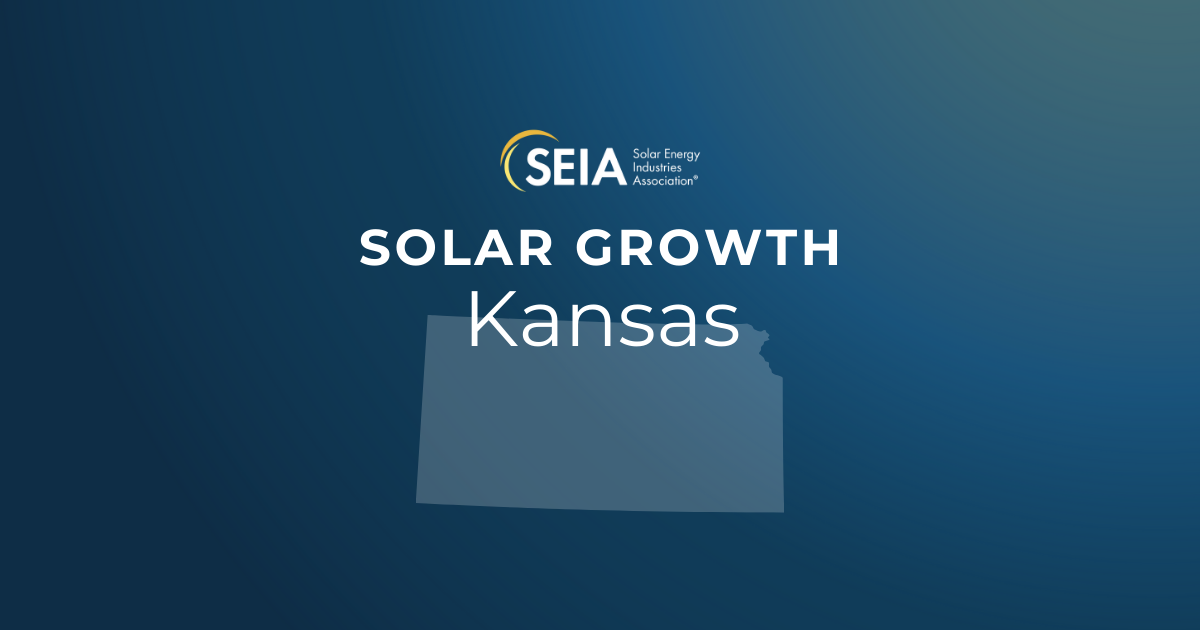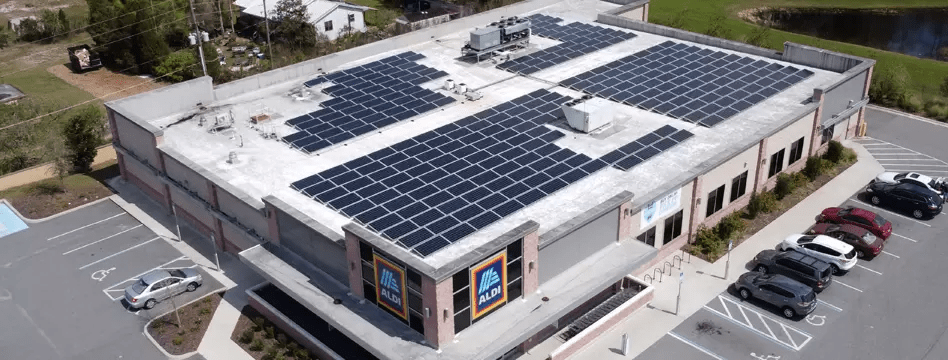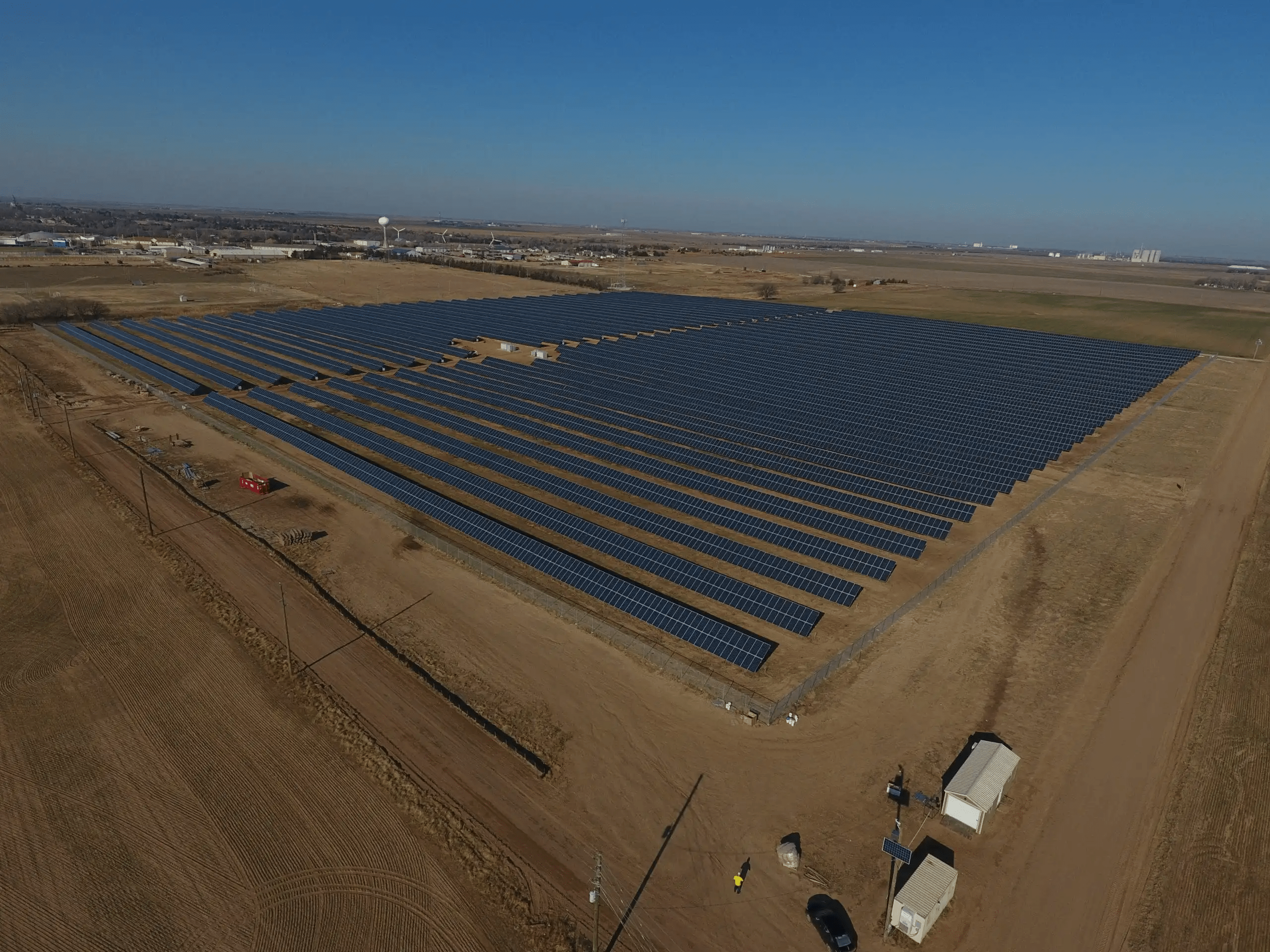State Overview
Kansas
National Solar Capacity Ranking: 50th
Data Current Through: Q4 2024

Kansas State Solar Overview

Data References:
SEIA/Wood Mackenzie Power & Renewables, Solar Market Insight 2024 Year-in-Review
IREC, National Solar Jobs Census
Energy Information Administration, Electric Power Monthly
SEIA, National Solar Database
Just The Facts
-
Solar Installed (MW):
172
-
National Ranking:
50th (47th in 2024)
-
Enough Solar Installed to Power:
24,639 homes
-
Percentage of State's Electricity from Solar:
0.43%
-
Solar Jobs:
1,082
-
Solar Companies in State:
42 (6 Manufacturers, 18 Installers/Developers, 18 Others)
-
Total Solar Investment in State:
$360 million
-
Prices have fallen:
42% over the last 10 years
-
Growth Projection and Ranking:
1,709 MW over the next 5 years (ranks 34th)
-
Number of Installations:
7,438

Kansas State Solar Policy Resources
-
Kansas Public Service Commission – Learn about the governing body that regulates the electricity rates and services of Kansas public utilities
-
Kansas State Legislature – Track pending legislation affecting solar energy, locate and contact individual legislators, and stay up to date on current legislative issues in Kansas
-
DSIRE Incentives Database – Kansas – Search a public clearinghouse for specific solar energy incentives in Kansas and across the United States
-
National Renewable Energy Laboratory – Kansas
-
U.S. Energy Information Administration – Kansas State Profile – Explore official energy statistics, including data on electricity supply and demand, from the U.S. government
Kansas Energy Storage Policy and Market Overview
Energy storage deployment in Kansas is increasing in accompaniment of renewable energy resource procurement. Abundant wind and solar resources in the state offer opportunities to incentivize energy storage. Comprehensive storage regulations in Kansas are reducing market uncertainties, expanding compensation streams, and creating a favorable hybrid resource marketplace.
Kansas regulators employ a top-down approach to procure storage by focusing on inclusive renewable energy funding. The state’s Renewable Energy Standard allows energy storage to be eligible for the procurement of RECs. In 2014, the state amended the Net Metering and Easy Connection Act to allow bi-directional metering and compensation for customer’s renewable energy resources, including those interconnected with energy storage. Kansas also requires annual reporting of all net metered facilities by utilities.
State statistics prove REC and net metering mechanisms may be supporting hybrid deployment. Wind & solar plus storage resources in Kansas contribute nearly 48% of the state’s total electricity portfolio.
Kansas Energy Storage Policy Resources
- Evergy Battery Storage Pilot Program – Research and development program designed to test home battery storage technologies at reduced customer costs.
- Memorandum for BESS CIME Property Tax Exemption –Kansas Department of Revenue rulings for C&I Machinery and Equipment Property Tax Exemptions for BESS and renewable energy systems.
- Kansas Energy Office Grant Opportunities – Funding opportunities for energy related projects through state and federally allocated grants.
- DSIRE Kansas Energy Storage Policy Database – Clearinghouse for financial incentives, regulations, and rebates for energy storage and lithium-ion technologies in Kansas and across the United States.
- Energy Storage Cost in Kansas – Up-to-date storage and solar-plus-storage pricing and find installers in Kansas on EnergySage.
- Kansas Corporation Commission – Governing body that regulates the electricity rates and services of Kansas public utilities, search for regulatory dockets, programs, and initiatives.
- Kansas State Legislature – Pending, passed, and historical legislation affecting energy storage and battery systems, locate and contact individual legislators, and stay up to date on current legislative issues in Kansas.





